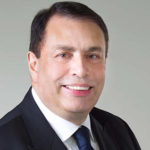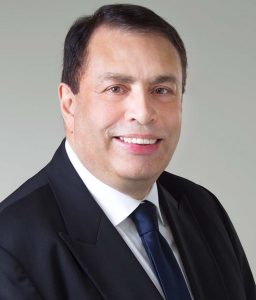Exclusive Interview
The Preparatory Committee (PrepCom) for the 2026 Review Conference of the Parties to the Treaty on the Non-Proliferation of Nuclear Weapons (NPT) was held from 28 April to 9 May, 2025 at the United Nations Headquarters in New York. Amid this development, PIR Center interviewed Dr. Tariq Rauf, former Head of Verification and Security Policy Coordination Department at the International Atomic Energy Agency (IAEA), PIR Center Advisory Board Member.
During the interview, issues of reporting format between the nuclear-weapon States (NWS), the NPT Review Process, and negative security assurances have been deliberated.
The interview was conducted by Ms. Alexandra Zubenko, PIR Center Consultant.
Alexandra Zubenko: 2025 NPT Preparatory Committee was held in New York. What are your general impressions about the conference?
Dr. Tariq Rauf: The Chairman circulated the draft elements of recommendations, along with the draft on strengthening the review process, over the weekend before the third session of the Preparatory Committee (PrepCom) began.
I believe this was a positive precedent that might be followed in future sessions. However, I find it problematic that the Chair chose to circulate SRP1—the first draft of recommendations on strengthening the review process — given that the 2023 working group on the review process did not produce any meaningful outcome. There was also considerable controversy regarding the nature of that working group: was it a one-off body that concluded its work in 2023, or was it intended to continue beyond that year?
In reality, the group only met in 2023 and was not reconvened in 2024. Moreover, the Chair’s document from 2023, which served as a basis for SRP1, was not well drafted and never agreed upon, and was the subject of significant disputes. For that document to now reappear as SRP1, and for the PrepCom to be asked to adopt it as a (draft) decision for next year’s review conference is quite surprising.
Alexandra Zubenko: How do you find the Chairman’s recommendations?
Dr. Tariq Rauf: I think the Chairman and his delegation have worked quite hard and consulted widely, which is commendable. In many cases, though, the challenge is not so much about the wording itself—it is about the substance of the issues. Some matters are inherently contentious, so even if the language appears balanced, one side may reject it outright if it does not go far enough to meet their expectations.
Take reporting, for example. China — and to a degree, Russia — have serious concerns about both the idea of a standardized reporting framework and the reporting items on nuclear disarmament. Meanwhile, many other non-nuclear-weapon States support these measures on accountability and transparency.
Even among the nuclear-weapon States, there is inconsistency. The UK and France support but do not fully adhere to the agreed reporting format, and while the U.S. has traditionally provided the most detailed information, its approach has shifted now.
Under the Biden administration, there was an extent of transparency where the U.S. continued to publish its New START data via the State Department’s website even after Russia suspended its participation in the treaty.
However, President Biden later reversed that position, and now even the U.S. no longer publishes that data. Russia, for its part, had already stopped sending its data to the U.S., which marked a clear halt in mutual transparency.
Alexandra Zubenko: I believe that reporting is one of the areas where we have seen some meaningful, if limited, progress. When I spoke with one of the P5 delegations, they acknowledged that discussions on reporting have become inevitable due to mounting pressure within the NPT framework. However, key questions remain — namely, where these reports should be discussed and in what format.
Dr. Tariq Rauf: A good precedent, in my view, was when Rose Gottemoeller and Amb. Antonov both gave detailed presentations on New START during one of the PrepCom sessions.
Personally, I believe that NWS reporting should be part of the formal proceedings—whether in the main room of a PrepCom, a Review Conference, or a subsidiary body. Side events are not an adequate substitute. They are informal, not recorded, and carry no official status. Holding reporting discussions in the main formal proceedings not only ensures they are part of the record but also lends them the legitimacy and accountability that such discussions require. I also believe there is growing support among States parties for this approach.
A related issue is whether UNIDIR, NGO or other “experts” should provide briefings on the reports submitted by the NWS. I have some reservations about that. While “expert” briefings can add value, they are best suited to side events. The main room should remain the space for States parties to engage directly, since they are the ones accountable for implementing the Treaty.
Besides, there is a lack of balance and geographic representation in “experts” attending NPT meetings. Most “experts” in this space come from Western countries, with very limited representation from the Global South, Russia, or China. This creates a perception — often justified — of a Western-dominated discourse, which undermines inclusivity and balance in the reporting dialogue.
Alexandra Zubenko: But was not there an agreed format for reporting by the NWS?
Dr. Tariq Rauf: There was a conceptual framework for reporting agreed between the nuclear-weapon States under Russia’s chairmanship in the framework of the N5 (P5) process that was presented at 2013 NPT Preparatory Committee. The details were discussed among the five nuclear-weapon States.
But the excessively detailed and complex reporting format proposed by NPDI, and by some other groups, I do not think that is either practical or feasible. The truth of the matter is that no one has time to read the working papers and national reports. Non-nuclear-weapon States report on their nuclear activities in the context of IAEA safeguards implementation, thus NPT Articles II and III are covered by that.
So, the only deficiency in reporting is that of the five NWS on their Article VI disarmament commitments. The NPT is the only multilateral forum where the five NWS are prepared to discuss their nuclear weapons policies because of the Article VI obligations.
Alexandra Zubenko: I reckon one of the questions that is gaining of consensus, is how the NNWS want to see negative security assurances (NSAs), since lots of them were saying that they want to see a legally binding agreement.
Dr. Tariq Rauf: NSAs are often discussed alongside positive security assurances (PSAs), such as those contained in UN Security Council Resolution 255 (PSAs) and Resolution 984 (NSAs). However, these are political declarations, not legally binding commitments.
That is a part of the problem — just like with no first use policies, the key questions are: how does one verify such assurances? And, how does one enforce them? From my personal perspective, both PSAs and NSA essentially are unenforceable in any practical or legal sense.
Alexandra Zubenko: Turning on to some other issues, I noticed that not many States like when the recommendations were being discussed at the end of the second week, not many States voiced their willingness to include the requirement that Russia withdraws forces from Ukraine, which was a progress compared to the previous PrepComs. Another interesting development is that, as I know, the U.S. did not want to mention Ukraine in the document. Does it give us some hope for the Review Conference?
Dr. Tariq Rauf: Yes, that is a good point. In 2022 at the review conference, I understand that Russia was willing to accept one reference to ZNPP in language that would be acceptable to them, but they did not want five references as were included in the president’s draft final document.
Now the fact that President Trump has opened a dialog with Russia on resuming normal diplomatic relations including nuclear arms control, and since at this PrepCom the U.S. delegation is not with political appointees but with career diplomats, their statements in general are more professional and less political.
President Trump also wants Russia to be invited back to the G7 so that it once again becomes G8; he also placed hopes on peace negotiations and a cease fire, and so I think neither side wants to say things here that can make things worse in this regard.
Alexandra Zubenko: Another question is on naval nuclear propulsion. One of the recommendations distributed by the end of the Session was ‘to encourage the IAEA to advance consideration of the approach, legal, verification measures required for establishing safeguards on naval nuclear propulsion’. Would Brazil accept this language?
Dr. Tariq Rauf: This remains a problematic matter, because under the NPT safeguards agreement (INFCIRC/153), nuclear material used in naval propulsion will be exempted from safeguards, and that is a big problem. Even Iran took advantage and took the opportunity to justify naval nuclear propulsion outside of IAEA safeguards as a clever play to justify their own uranium enrichment program. The president managed to get compromise text on a few lines at the 2022 Review Conference:
The topic of naval nuclear propulsion, has generated interest among States parties to the Treaty regarding, inter alia, arrangements to ensure that such nuclear material will not be used for the production of nuclear weapons or other nuclear explosive devices.
In this regard, the Conference notes the importance of the IAEA’s consideration, in consultation with the States concerned, of arrangements related to naval nuclear propulsion and for continuing dialogue and transparency in accordance with the rules of the relevant bodies.’
Alexandra Zubenko: The 1995 Resolution on the Middle East has received a lot of attention during this PrepCom. Could you comment on how discussions around this issue have evolved?
Dr. Tariq Rauf: This now is a paradoxical situation. At the UN Conference on the Establishment of the Conference in Middle East, the Arab States refer to the mandate as being the 1995 Resolution on the Middle East and that the NPT review process is being spared the complexities of the matter (given that the 2015 review conference collapsed in failure on the Middle East issue).
Here, at the PrepCom, the Arab States refer to the UN Conference to implement the resolution, and say that the three co-sponsors of the Resolution, that is the Russian Federation, United Kingdom, and the United States bear a special responsibility for its implementation, and to bring Israel to the table (which continues to boycott the UN Conference and all other forums on a Middle East nuclear-weapon and WMD-free zone).
I am critical of the UN Conference being designated as the implementation forum for the 1995 Resolution, as clearly the action and implementation of the Resolution belongs in the NPT review process.
Alexandra Zubenko: Why do you think consensus was not achieved at this Preparatory Committee?
Dr. Tariq Rauf: In disarmament diplomacy, we cannot and should not aim for perfection—because perfection is not achievable. Instead, we should recognize and accept certain imperfections if they serve the broader purpose of sustaining the Treaty.
Sometimes, we may have to say: “We did not like this part, or that formulation, but we can live with the outcome document because fundamental security interests are not compromised and the integrity and authority of the NPT are of paramount importance.” Unfortunately, many delegations are not willing to take that approach. They want the final document to reflect exactly what they want to see — nothing more, nothing less.
Another missed opportunity, in my view, is in the drafting language. For example, on the TPNW, there could have been a more balanced formulation such as: “Many States consider the TPNW to be an effective measure…” and then follow with “while other States do not share this view.” That kind of language allows for acknowledgement without forcing consensus. I think we need a more flexibility and creativity in drafting if we are to be serious about bridging divides.
Lastly, the review process is not to blame –– the blame lies squarely with States parties for being unable to demonstrate flexibility and compromise in the larger interest of the NPT. It is unfortunate that States parties do not understand that any “recommendations” transmitted by the PrepCom to the review conference, do not reflect their final positions which are to be tabled at the review conference, and furthermore that the review conference is not bound by the “recommendations”.
Instead of wasting time and effort on trying to reform the strengthened review process, which does not need to be reformed; it is flexible enough were States parties determined to act in the larger interest of the Treaty and to rise above their fixed positions.
Keywords: NPT; PrepCom; Nuclear Nonproliferation
NPT
F13/AST – 25/05/20




